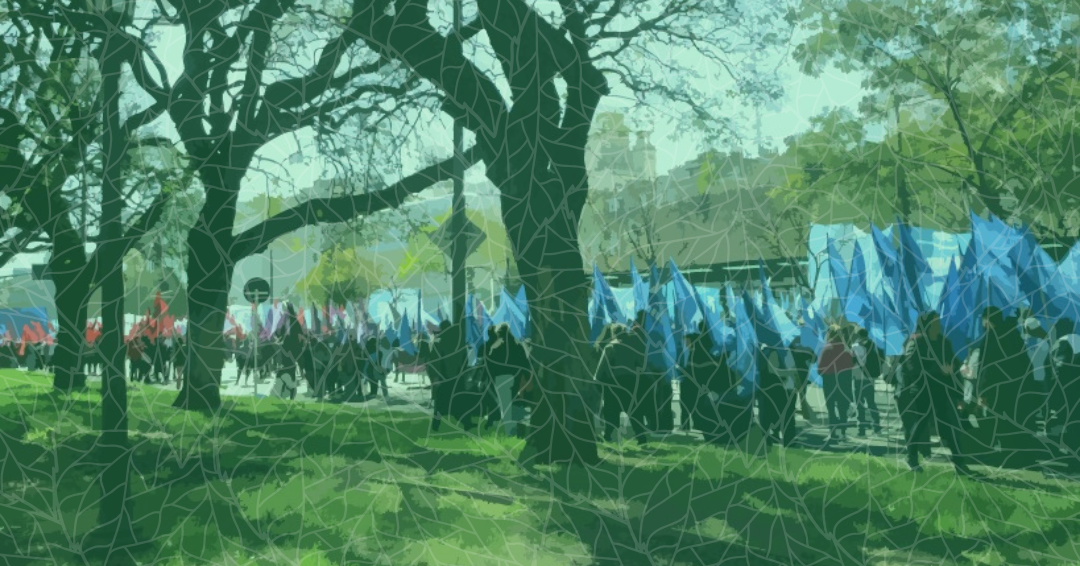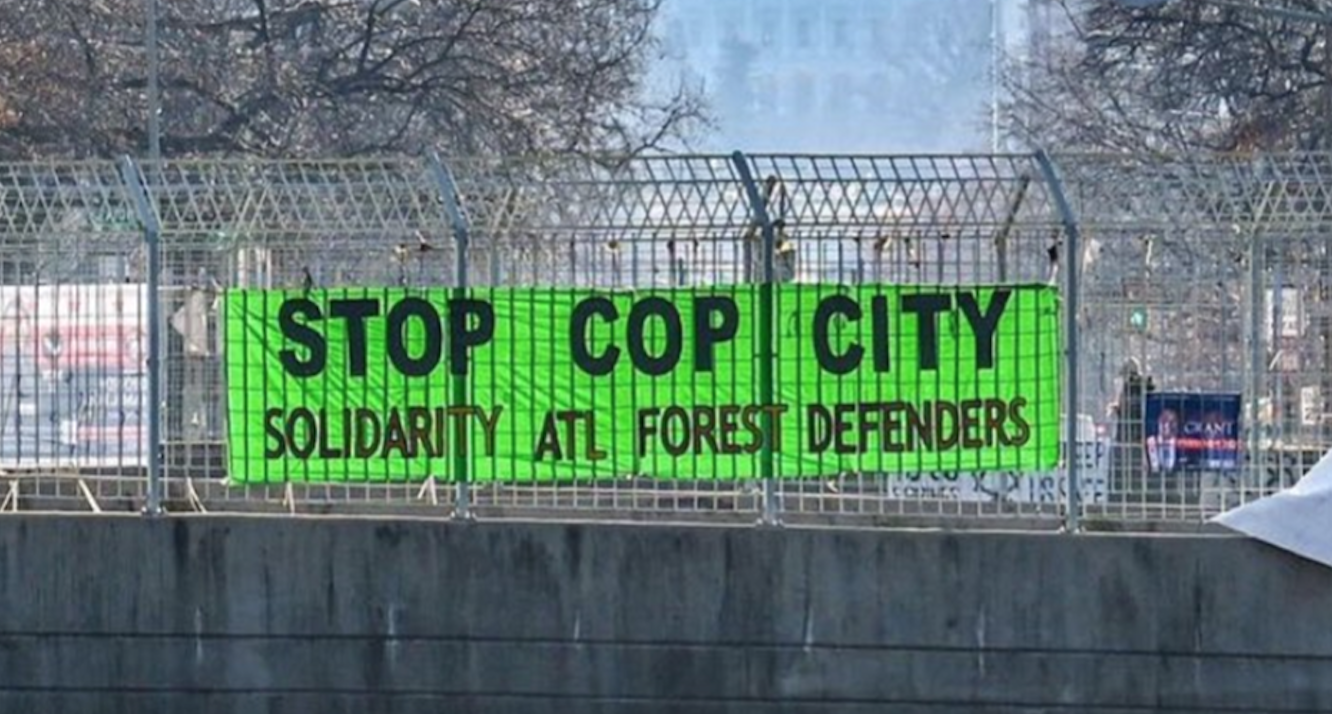In a previous article you may have read about the book Degrowth & Strategy; it was still a work in progress then and we were reaching out for financial support. Today, July 27th 2022, the collected volume Degrowth & Strategy: how to bring about social-ecological transformation is finally out! It may be downloaded and read for free on the publisher’s website, and an affordable paperback copy can be purchased from various re-sellers.
When the association Degrowth Vienna was founded for the purpose of organising the May 2020 International Degrowth Conference, we had no clue we would stand here now. The conference sparked debates that called for some sort of summary. What was initially meant to be a handy wrap-up for the conference participants gradually turned into a much larger project: 8 editors, 19 chapters, 47 authors, about 120 hours spent on editorial team calls, and 416 pages of reflection on strategies for degrowth. From a short publication, this project evolved into a full-grown book.
We think we have achieved a collected volume which, despite its many authors, reads like a consistent monograph addressing the crucial question of strategising for degrowth. Environmental and social movements around the world have been fighting for an alternative to neoliberal capitalism for years. And still, as this year’s IPCC report demonstrates, we are further away from climate justice than ever. Efforts to bring about emancipatory social-ecological transformation must become more effective as the threat of climate change and oppressive means of responding to it looms large. The strategy question addresses precisely this issue.
Strategizing means connecting an analysis of what combination of processes might bring about systemic change with an actor’s self-reflection about their own role and capabilities in the system as well as an assessment of what other actors – allied or opposing – are doing. Together, these analyses yield a map that can help actors decide what actions to take, how to coordinate with others and how to communicate about their actions. Our book situates itself within broader debates about how social and environmental movements can become more effective. At the same time, it poses the strategy question specifically for the degrowth movement and for the sort of social-ecological transformation it calls for. The case for degrowth has been made many times, and various considerations about degrowth utopias have been outlined. Our book advances the debate about how to get there.
How do various types of political strategies contribute to the development of a post-capitalist, degrowth alternative? What does the degrowth map look like? Who will play what role in transitioning from our current capitalist societies to degrowth societies? Asking for ever more policy proposals from supposedly benign national governments will not suffice. At the same time, independent degrowth niches are constantly threatened in their existence and fail to avert harm done by dominant systems at a larger scale. What roles can these types of strategy nonetheless play? What might be the role of more ruptural, direct action? How do we ensure the transition is fair and responds to the voices of marginalised parts of society? What is the role of the degrowth movement within a larger group of movements and organizations for change? How can the degrowth movement coordinate itself internally to become more effective in its own strategizing efforts?
Such questions are to be found in Degrowth & Strategy. They are addressed from a more theoretical perspective in the first part of the book. In the second part they are explored in the context of various topical fields and structures of the capitalist society (e.g. the food system, energy provision, money and finance or care), each accompanied by a case study of a degrowth-like initiative and its strategies. A complete overview of the themes and questions addressed can be found by checking the book’s table of content.
Picking a publisher was not an easy task as we struggled to combine our desire to give the book visibility with our wish to make a timely contribution to an active debate within degrowth activism. In the end, we decided on independent publisher MayFly Books, which in our view operates most in line with degrowth principles and best served our goal of making the book affordable and quickly accessible. MayFly publications have a creative commons licence, which allows us to make a PDF version of the book available for free online. Paperback copies are available at very fair prices.
Overall, the journey was long and winding, full of surprises and unexpected curves, of deadlines that kept being postponed, of problems and consensus reached after long Zoom discussions, of laughing, of learning.
But the journey is by no means over, for many questions remain open. Many chapters of the book rely on a framework adapted from Erik Olin Wright to classify strategies, but Part I of the book also features alternative frameworks for thinking about systemic change and the strategizing related to it. What frameworks degrowth activists and researchers will find the most conducive to effectively coordinating and evaluating strategies in practice remains to be seen.
We were also not able to include all the topics we would have liked to discuss in the book. For example, the way in which abstract strategy discussions can be translated into concrete contexts and what this implies for evaluating different tactics would be an important next area of investigation. Further, while we have a few chapters featuring more international voices, most of the considerations outlined pertain to strategizing within the Global North – more specifically in Europe. Given the global nature of most supply chains and the international structures of domination created by the capitalist system, strategizing really needs to involve the coordination of struggles around the world. Future debates about strategy still need to engage with a global perspective on transformation so that we struggle for a society that can truly promise a good life for all within planetary boundaries.
Nevertheless, we think Degrowth & Strategy provides a good first reflection on the need, the meaning of and various approaches to strategizing for degrowth. We hope that it sparks further engagement on the topic, both amongst academics and practitioners.
Such further engagement has started at Degrowth Vienna with a new working group dedicated to spreading and engaging with the book’s content. So far, this new working group’s efforts have materialised in a handful of podcasts featuring interviews with authors and editors, and in a launch event that took place in person in Vienna last month. Meanwhile, Degrowth Vienna is continuing to strategize about how to promote degrowth within its own social and political environment. Finally, we are happy to say that a duo of authors who met while working on a chapter of Degrowth & Strategy kept in touch and are now engaging in further academic cooperation.
This engagement has to continue and expand. Read the chapters you find interesting or the whole book if you fancy, enjoy it, speak about it, order it at your institution’s library or for you own private collection, criticise it, improve it by writing your own blog post or paper or by embodying strategies is a different way. Strategise well for social-ecological transformation!
Where to find Degrowth & Strategy:

Militant-scholar, Ana Inés Heras, writes about collaborative projects between her research team at the Argentinean Council and various self-governed local communities and groups.

This article explores the Defend the Atlanta Forest struggle and discusses how this fight relates to degrowth.

Degrowthers have recently seemed to find a lot of inspiration in Erik Olin Wright’s framework of political strategies for transformations beyond capitalism. In this blog post, we wish to highlight some crucial insufficiencies of Wright’s framework in relation to degrowth transformations, and propose some adaptations which can enhance its utility for further strategy discussions.